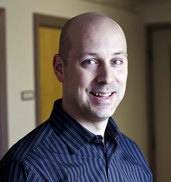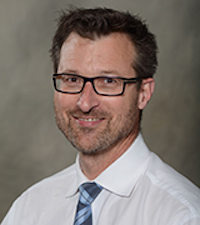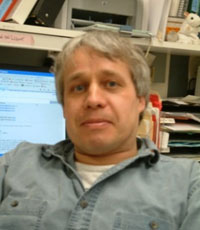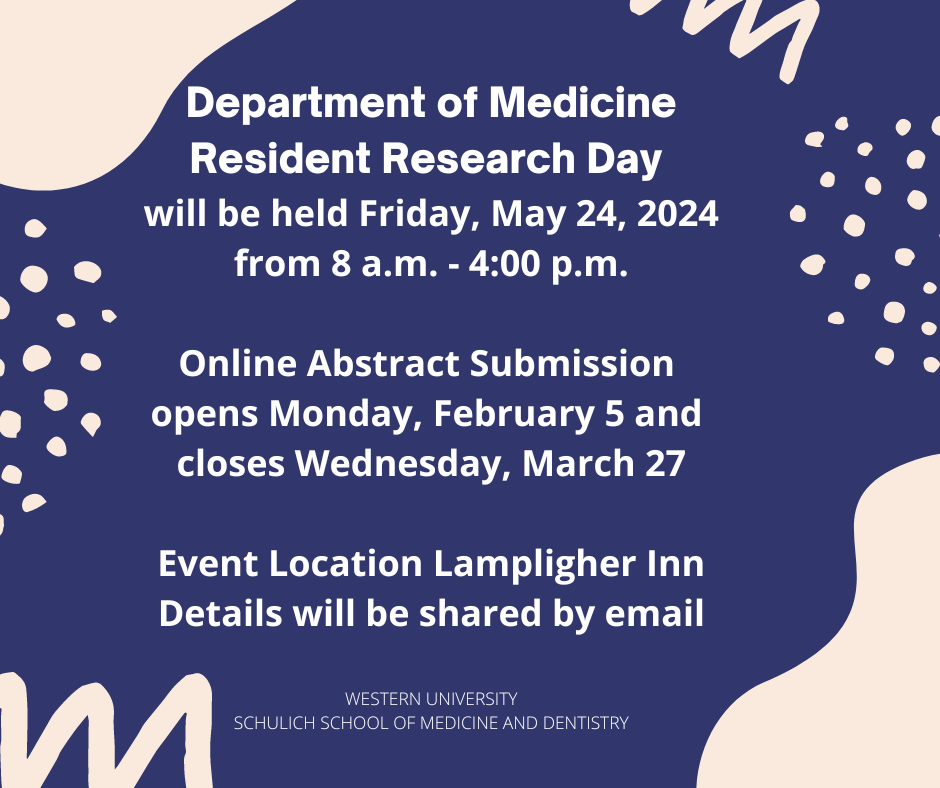| Respirology anurag.bhalla@sjhc.london.on.ca |
|||
 ANURAG BHALLA, MD, FRCPC, Assistant Professor ANURAG BHALLA, MD, FRCPC, Assistant ProfessorBio sketch and keywords unavailable. | |||
| Respirology sgill8@uwo.ca |
|||
 Sean Gill, PhD, Associate Professor Sean Gill, PhD, Associate ProfessorDr. Gill is an Associate Professor in the Departments of Medicine and Physiology & Pharmacology at Western University, as well as a New Scientist with the Lawson Health Research Institute in the Critical Illness Research Program. He received his PhD in Physiology from Western in 2006 and completed postdoctoral training at the University of Washington in Seattle, Washington. He joined the faculty at the University of Washington in the Division of Pulmonary and Critical Care Medicine as an Acting Instructor in 2010 before returning to Western in 2012. Research in Dr. Gill’s laboratory is currently focused on the resolution of inflammation and repair following lung injury. Lung injury, which leads to acute respiratory distress syndrome (ARDS), is characterized by profound inflammation, edema, and tissue injury often resulting from trauma or severe pulmonary infection. Although ARDS survival rates have improved in recent years, 25 to 40% of cases remain fatal, and of those patients that do survive, persistent inflammation and fibrosis can result in continued pulmonary complications. Current projects in Dr. Gill’s lab include assessing the role of metalloproteinases and their endogenous inhibitors, the tissue inhibitors of metalloproteinases (TIMPs) in regulating three different aspects of recovery following lung injury: 1) microvascular endothelial cell dysfunction; 2) macrophage polarization and apoptosis; and, 3) initiation and resolution of fibrosis. Additional projects include examining the role of caspases and cell death in microvascular endothelial cell dysfunction during septic lung injury, and determining the effects of aging and exercise on the pathophysiology of lung injury. Dr. Gill’s lab uses multiple murine models of direct lung injury, including bleomycin (a model often used to study chronic lung injury and fibrosis) and Pseudomonas aeruginosa infection, as well as cecal ligation and perforation, a murine model of sepsis that results in indirect lung injury. Techniques such as flow cytometry, immunohistochemistry, quantitative real-time polymerase chain reaction, western blotting, and enzyme activity assays are then used to examine how specific cell populations are affected during lung injury. Keywords: Apoptosis Endothelial cell dysfunction Fibrosis Innate immunity Lung injury MMPs Mouse models Resolution of inflammation TIMPs | |||
| Respirology chris.licskai@sjhc.london.on.ca |
|||
 CHRISTOPHER LICSKAI, MD, BSc, FRCPC, Associate Professor CHRISTOPHER LICSKAI, MD, BSc, FRCPC, Associate ProfessorBio sketch unavailable at this time. Keywords: Air quality and health Community program development and evaluation Electronic tools in chronic disease management (m-Health) Knowledge translation: Health system innovation | |||
| Respirology cmacke3@uwo.ca |
|||
 CONNIE MACKENZIE, MD, FRCPC, Associate Professor CONNIE MACKENZIE, MD, FRCPC, Associate ProfessorBio sketch unavailable at this time. Keywords: Clinical toxicology Occupational lung disease Pharmacogenetics of steroids in asthma | |||
| Respirology sanjay.mehta@lhsc.on.ca |
|||
 SANJAY MEHTA, MD, FRCP(C) SANJAY MEHTA, MD, FRCP(C)
Sanjay Mehta grew up in Montreal, and graduated from McGill University in Montreal in 1988. He completed residency in Internal Medicine and a Fellowships in Pulmonary Medicine at McGill. He began his research training at McGill, before completing Fellowships in Pulmonary Research at Harvard University, Boston and Victoria Hospital, London. Current positions include: • Professor of Medicine, Schulich School of Medicine & Dentistry, Western University • Consultant Respirologist and Director of the Southwest Ontario Pulmonary Hypertension Clinic, London Health Sciences Center • Clinician-Scientist, Program of Critical Illness Research, Lawson Health Research Institute, LHSC • Founding Board Member 2008 / Chair of the Board of Directors 2013-2019 / Eternal PHriend of PHA Canada 2018, Pulmonary Hypertension Association (PHA) of Canada Dr Mehta has been looking after PH patients for 30 years, since he was a resident at McGill in the 1980s, and as a PH specialist in London since 1996. He has also participated in many clinical research studies with PH patients. He is very active in the education of physicians and healthcare providers about PH, and has been part of many Canadian and international PH guidelines. Keywords: Acute lung injury Endothelial cell biology Exercise physiology Nitric oxide biology Pulmonary hypertension Respiratory physiology Sepsis | |||
| Respirology hana.serajeddini@lhsc.on.ca |
|||
 HANA SERAJEDDINI, MD, FRCPC, Assistant Professor HANA SERAJEDDINI, MD, FRCPC, Assistant ProfessorDr. Hana Serajeddini is an Assistant Professor with the Division of Respirology at Western University. She attended medical school at the University of Ottawa, Faculty of Medicine and then completed her Internal Medicine and Respirology residency training at Western University. She won the Schulich School of Medicine Resident Research Career Development fellowship award, allowing further subspecialized clinical and research fellowship training in Complex Airway Diseases at McMaster University in the Firestone Institute of Respiratory Health. Her research and clinical interests focus on optimizing care for patients with complex obstructive airway diseases, as well as translational and clinical research using innovative imaging and laboratory technologies. Keywords: Lung Imaging, CT and hyperpolarized gas MR imaging of the lung Severe Asthma Translational clinical research | |||
| Respirology rveldhui@uwo.ca |
|||
 VELDHUIZEN RUUD, PhD, Associate Professor of Medicine, Associate Professor of Physiology & Pharmacology VELDHUIZEN RUUD, PhD, Associate Professor of Medicine, Associate Professor of Physiology & Pharmacology
Ruud Veldhuizen is an Associate Professor in the departments Medicine and Physiology & Pharmacology at the University of Western Ontario, as well as a scientist at the Lawson Health Research Institute. He received his PhD in biochemistry from the University of Western Ontario in 1993 and started as a scientist at the LHRI in 1997 focussing mostly on the role of surfactant in health and disease. The current objective of research in his lab is to understand the mechanisms leading to Acute Lung Injury (ALI) and to develop logical treatment strategy to improve the outcome of patients afflicted with this syndrome. ALI is defined by the inability of the lung facilitating the diffusion of oxygen from the atmosphere into the blood and has a reported incidence of about 70 cases per 100,000 person-years, with a mortality of approx. 40%. The Veldhuizen lab, together with his collaborators Drs Jim Lewis, Cory Yamashita and Fred Possmayer, focus on four aspects of ALI. A first and longstanding interest is the role of the pulmonary surfactant system in ALI. Impairment of the pulmonary surfactant system contributes to the lung dysfunction associated with ALI; novel biophysical approaches such as atomic force microscopy and captive bubble surfactometry are utilized to establish the molecular basis for surfactant dysfunction. The second area of investigation is the role that mechanical ventilation plays in the progression of the disease. To this end animal models are employed to study the impact of various ventilation strategies in the presence and absence of pre-existing lung injury. Based on the fact that in most people the main cause of mortality for patients with ALI is multiple organ failure (MOF), the third area of interest in the Veldhuizen lab is the link between the lung and the development of MOF. Using both in vivo, ex vivo and in vitro methodology, the mechanisms by which lung inflammation can become decompartmentalized and thereby impact other organs is investigated. Finally, the most recent area of research is to study factors that may render patients more susceptible to the development and/or progression of ALI and MOF. Currently, the impact of hypercholesteremia on disease progression is investigated in animal models. Keywords: Acute lung injury Biophysics Cholesterol Gastric Acid Aspiration Inflammation Multi-organ failure Phospholipids Pulmonary Surfactant Respiratory Physiology Sepsis | |||
| Respirology Cory.Yamashita@sjhc.london.on.ca |
|||
 CORY YAMASHITA, MD, FRCPC, Associate Professor CORY YAMASHITA, MD, FRCPC, Associate Professor Cory Yamashita, MD, FRCPC, is a clinician-scientist in the Division of Respirology. Dr. Yamashita completed his BSc and MD at the University of Manitoba (’01) and subsequently completed his residency in Internal Medicine and fellowship in Adult Respirology at the University of Western Ontario (’01-’05). Subsequent to his clinical training, Dr. Yamashita completed a research fellowship under the mentorship of Drs. Jim Lewis and Ruud Veldhuizen (Lawson Health Research Institute, ’05-’07), and pursued a further basic science fellowship under the direction of Dr. Greg Downey (National Jewish Health, Denver, CO, ’07-’09) focusing on molecular mechanisms of acute lung injury and repair. Currently, his research interests include i) mechanisms of acute lung injury and ii) the use of antimicrobial peptide fortified surfactant preparation in bacterial lung infections. Current projects in these areas are focused on the role of matrix metalloproteinase-3 and alveolar macrophages in ARDS/ ventilation induced lung injury and the use of novel antimicrobial surfactant preparation in patients with cystic fibrosis. Dr. Yamashita currently supervises undergraduate and graduate level trainees through a cross-appointment in the Department of Physiology and Pharmacology. Keywords: Acute lung injury Acute repiratory distress syndrome Antimicrobial peptides Cystic fibrosis Pulmonary Surfactant Ventilator-induced lung injury | |||


